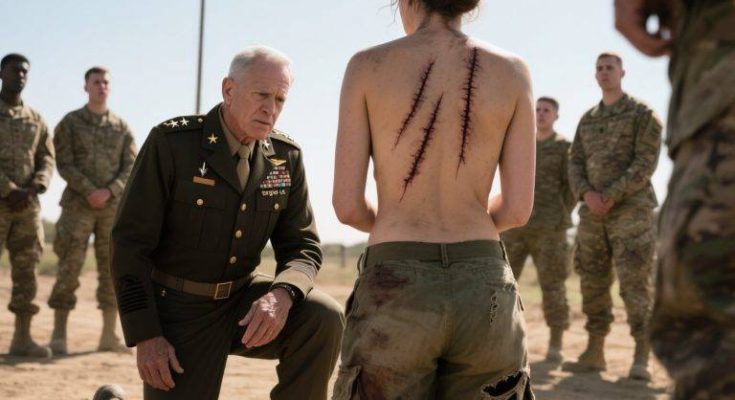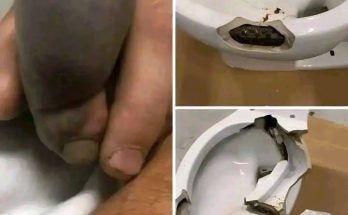he circle tightened, and the air, already thick with the stench of sweat and misplaced bravado, became suffocating. The whispers were gone, replaced by the open, baying taunts of a mob that had scented blood. They saw a beggar. They saw a stray. They saw a woman, out of place, and their fragile pride demanded she be broken.
They didn’t see the 89 days.

They didn’t see the frozen mud of the Terek Pass, or the taste of burnt rations mixed with snow. They couldn’t smell the high-altitude cordite or the copper-iron tang of blood freezing before it could even stain the ground. They had no concept of what it meant to hold a teammate’s hand, feeling the life drain out of him, while your other hand was busy silencing the sentry who had taken him from you.
These recruits, with their fresh buzzcuts and parade-ground polish, were playing a game. I was just trying to get home.
A stocky man with a face like a worn boot and a name tag reading ‘Sergeant Callahan’ shouldered his way through. His eyes were small, suspicious, and utterly lacking in imagination.
“Who let you in here without orders or identification?” he demanded. His voice was a gravelly bark, practiced and perfected on generations of terrified 18-year-olds.
I said nothing. I was listening. Listening to the base’s hum. The rhythm of the drills. The distant thwack-thwack-thwack of a helicopter I couldn’t yet see. I was cataloging, assessing. The chip in my boot felt heavy, a single point of cold reality in this circus of fools.
“I asked you a question, lady.” Callahan stepped closer, invading my space.
I met his eyes. I didn’t see a man. I saw a uniform, a rank, a set of procedures. He was a flowchart, and I was an anomaly he couldn’t process.
I tilted my head, a simple movement that I knew, from long experience, was deeply unsettling to men like him. “Area A, command protocol. Eight lines,” I said. My voice was rusty, low. I hadn’t used it much in three months, not for conversation. “Want me to recite it?”
The silence that followed was different. Not respectful, but confused. A dog tilting its head at a sound it doesn’t understand.
Callahan’s smirk was a thing of practiced arrogance. “Go ahead.”
So I did. I recited the classified operations protocol for Fort Ramsay. Word for word. I recited the update from three weeks ago, the one that hadn’t even been fully disseminated to the line units yet. I recited it in the flat, dispassionate monotone of a computer, an audio file playing back from memory.
A lanky lieutenant with a clipboard—Harper, his tag read—froze. I watched his face cycle through confusion to dawning, terrified comprehension. “That… that protocol was only updated in last month’s classified memo,” he stammered, half to himself.
His eyes, magnified by his glasses, locked on me. “Who are you?”
I didn’t answer. I reached into my pocket and pulled out the small, folded piece of cloth. The one they’d all missed. It was faded, stiff with dried… well, they didn’t need to know what. But the emblem, a black echo against a field of gray, was there if you knew how to look.
“I wrote it,” I said, simply.
Harper’s clipboard clattered against his belt. His hand fumbled. “Black Echo,” he breathed, his voice a ghost. “They… they haven’t been active in years.”
“If you’re claiming that,” he said, his voice dropping to a whisper as he regained a fraction of his composure, “you better have more than a rag to prove it.”
I reached into my sleeve. Not for a weapon. For a memory. I pressed the small metal pin—worn, scratched, the crescent moon and three lines barely visible—into his trembling hand.
He looked at it. His face went from pale to ashen. “This… this can’t be real.” He’d seen the symbol. Once, in a briefing he was never supposed to have attended. A briefing about ghosts. About a unit that didn’t exist, tasked with missions that were never recorded.
The mood on the field had shifted, but the mob’s momentum was too great. Their ignorance was a freight train, and Harper’s sudden fear was just a pebble on the tracks.
By noon, the game had escalated.
They dragged me—and yes, it was dragging, their hands leaving greasy marks on my sleeves—to the center of the courtyard. The sun was a hammer. They’d found a piece of cardboard and a thick black marker. IMPERSONATOR. They propped it up behind me.
It was pathetic. It was a child’s tantrum. But it was also dangerous. The chip in my boot felt like it was burning a hole through my sole. The mission. The mission. Focus on the mission.
This was when she arrived. Captain Ellis.
She was everything I was not. Her uniform was so crisp it looked like it could cut paper. Her blonde hair was a rigid, lacquered helmet. She moved with the sharp, strutting confidence of someone who had never been truly tested, who had risen through the ranks by mastering regulations, not by surviving reality. Her smile was sharp and bright and utterly devoid of warmth.
“No name tag. No ID,” she announced to the assembled crowd, her voice carrying across the courtyard. She was performing. “She’s impersonating military personnel.”
She reached out, her fingers quick and practiced, and ripped the faded Black Echo patch from my chest. The original patch. The one Elias had sewn on my uniform himself, the night before we crossed the border. The stitching, he’d joked, was as ugly as I was. It was the last time I’d heard him laugh.
Ellis held it up like a trophy. “A fake,” she declared. “The stitching’s all wrong.”
A wave of hot, black rage surged up from my stomach, so potent it made me dizzy. My hand twitched. It would be so easy. Two seconds. A twist of the wrist, a strike to the throat. She’d be on the ground, gurgling, before anyone even knew what had happened.
I held back. I made my hand a fist, then forced it to relax, finger by painful finger. The mission. It wasn’t about me. It was about Alex, and Maria, and Elias. It was about the chip.
I saw a young female recruit at the back. Larson. I’d clocked her earlier. She was different. She wasn’t laughing. She was watching me, her arms crossed, her face a mask of conflicting emotions. She looked… familiar. Like a girl I’d known from home, a girl who’d had to fight for every scrap of respect. She looked away, but not before I saw the flicker of shame in her eyes. Shame for them. And for herself, for not speaking.
They tore through my bag. The old canvas thing that had been with me for the last 89 days. They dumped it on the gravel. A dented lunchbox. A roll of bandages. A small pouch of salt.
“What you planning to cook for us?” one of them sneered, holding up the lunchbox. Laughter. The salt. Elias had given it to me. “For the ghosts,” he’d said, a half-smile on his face. A little ritual from his grandmother. “To keep them away. Or to honor them.” Now, it was just salt, spilling into the dust. My fingers twitched again. The lunchbox. They didn’t open it. If they had… If they had, they would have found the false bottom. And under it, the small, leather-bound journal. The last words of my team. Their letters home. Don’t touch it. Don’t touch it. Don’t touch it. My eyes flicked to the lunchbox, just for a second. My gaze must have been too intense. “Add her to the expulsion list!” a broad-shouldered officer yelled, slamming his fist on a table. “She’ll be investigated for impersonation.”
Ellis stepped closer, her voice dripping with a fake, saccharine pity. “If you’re really a soldier, where’s your proof? No papers, no tags. You’re not fooling anyone.”
I shifted my weight and looked past her, at the heat haze rising from the tarmac. She wasn’t worth my attention. This, of course, was the greatest offense.
“You think you’re above this?” she snapped. “Stand there and bake. Maybe the sun will loosen your tongue.”
The hours… they blurred. The sun was relentless. I locked my knees, but not really. I shifted my weight, heel to toe, almost imperceptibly. I let the heat bake my skin, but inside, I went cold. I went back to the Terek Pass.
The mission was simple. Infiltrate. Acquire the asset. Exfiltrate. Simple. Except the “asset” wasn’t a person. It was this chip. A kill switch for a network so vast, so deep, that it could bring our entire defense grid to its knees. The enemy had it. We had to get it back.
Black Echo was activated. The four of us. Elias, the leader, the rock. Alex, the tech wizard, fingers like a surgeon. Maria, the sniper, the ghost. And me… I was the one who got them out. The specialist. The one who did the… work.
It took 50 days just to get to the facility. A concrete bunker buried under a glacier. The air was so thin it felt like breathing glass. We got inside. Alex worked his magic. He held the chip, a tiny black square, in his palm. “Got it,” he whispered, his voice cracking over the comms. “It’s… it’s beautiful.”
That’s when the alarms went off.
Maria’s rifle was the first sound. A clean, sharp crack. Then the world exploded. We ran. For 39 days, we ran. Through mountains, through forests, through villages that had never seen a foreigner. We ran, and we fought.
Alex died on day 62. A sniper round. He’d been lagging. He’d given me the chip. “Don’t… don’t drop it,” he’d gurgled, a bloody smile on his face. I’d used the Z-stitch to close the wound, a post-border extraction technique. A field-expedient suture. It was pointless, he was already gone, but I… I couldn’t just leave him open.
Maria died on day 78. A minefield. She’d seen it. Pushed me back. “Go,” she’d mouthed. The blast was… quiet. The snow muffled it. I just felt a spray of hot wetness on my face.
Elias made it to day 89. One day from the extraction point. We were crossing a river, ice cold. We were skeletons. He was hit. Not a bullet. He just… stumbled. An old wound, infected. “Commander,” he’d whispered, his teeth chattering. He’d never called me that before. “You… you have to…” He’d pushed the last of his rations into my hand. A single, stale cracker. “Get… home.”
I’d held him as he went cold. I’d taken his patch. I’d used the last of my strength to cover him with stones. Then I walked the last 10 miles. Alone.
I’d survived 89 days of hell. I could survive a few hours of children.
“Hey! She’s not even blinking, man.” “Dangerous? Her? She’s just some nobody.” The maintenance worker, an older man with grease on his face, watched from the shade. He’d seen this before. Maybe not this, exactly, but he knew the look. The thousand-yard stare. He knew someone who had been through the fire and come out the other side… changed. “They’re kicking a hornet’s nest,” he muttered to his wrench. He was right.
Then, the medical check. A formality. They marched me to a tent. Dr. Patel. A tired, older man. He was just doing his job. He rolled up my sleeve. And he stopped. He saw it. The Z-shaped scar on my wrist. The one I’d practiced on myself, years ago, before I’d had to use it on Alex. “This… this stitching,” he muttered, his voice low. “Only operatives trained for post-border extractions are taught this technique.” He looked up at me, really looked at me. His eyes weren’t mocking. They were afraid. He turned to the senior commander, Colonel Vance, who was overseeing the humiliation. “Sir,” Patel whispered, “if she’s who I think she is… we’ve made a huge mistake.” Vance. Another one like Ellis. All polish, no spine. “Continue the search,” he said, his voice clipped. “No documents, no entry.” A junior medic, his hands shaking, dropped a tray of tools. The clatter was deafening. He’d heard the stories. He’d seen my eyes.
Ellis overheard Patel’s whisper. It didn’t make her cautious. It made her angry. She thought I was pulling a con, and she was furious that the doctor had almost fallen for it. She strode back into the center of the courtyard. Her face was flushed. “If you’re not hiding anything,” she shouted, her voice a shrill command, “then take off your shirt! Let’s see if there’s any unit tattoo on your back!”
The words hung in the air. A line had been crossed. This wasn’t procedure. This wasn’t protocol. This was assault. The crowd, sensing a new level of drama, took up the chant. “Take it off! Take it off! Take it off!”
My hands clenched. The blood roared in my ears, louder than the voices, louder than the helicopter that was now clearly audible, approaching fast. Elias. Alex. Maria. They died for this. For the chip. And this… this harpy… was trying to turn their sacrifice into a sideshow. My jawline tightened. An old scar there, from a knife I hadn’t seen in time, pulled taut. Private Larson. I saw her at the back. Her mouth was open. She was about to shout. To say… something. No, kid. Don’t. It’s not your fight. I let my hands relax. I let the rage settle, cool, and harden into something else. Into a decision. Fine. You want to see? You want proof? I’ll give you proof.
I didn’t turn around. I didn’t give them the satisfaction. Ellis, emboldened by my silence, grabbed my collar. She yanked. The fabric ripped. A gust of wind, cold and sudden, swept through the courtyard. It felt like Maria’s last breath. The shirt came down. My back was exposed.
The chanting stopped. It didn’t fade. It stopped. Like a switch had been thrown. The world went from a roar to absolute, deafening silence. All I could hear was the thwack-thwack-thwack of the approaching helicopter and the blood pounding in my temples.
They weren’t tattoos. They were three long, parallel scars. From my left shoulder blade to my right hip. They were clean, deliberate, silvered with age. Not the jagged marks of a whip or an accident. These were carved. Given. Earned. The oath ritual of Black Echo. A blade, a promise, and a fire. Each scar for a vow: One for the mission. One for the team. One for the silence. Elias had one. Alex had one. Maria had one. And now, only I was left to carry them.
The silence stretched. A few recruits in the front row looked physically ill. Ellis’s hand, the one still holding a piece of my shirt, was frozen in mid-air. Her face was a grotesque mask of confusion and dawning horror.
That was when he walked in. Lieutenant General Hol. A man whose chest was a constellation of medals. A man who had seen battlefields these recruits only read about in history books. He was on his way to inspect them, to give a speech about honor and duty. He saw the crowd. He saw the frozen tableau. And then he saw my back. He stopped. His face, weathered and stern, went utterly, terrifyingly pale. He didn’t speak. He didn’t shout. He took one step forward. Then another. The crowd parted for him, a wave receding from a cliff. He stood three feet behind me. I could feel his eyes on the scars. I felt him tremble. A senior officer, Major Klein, rushed over. “Sir?” Hol raised a hand, silencing him. Klein’s eyes followed Hol’s gaze. “Three… three blade scars,” he whispered, his voice cracking. “The… the oath ritual… of Black Echo.”
The name. The name that wasn’t supposed to be spoken. Not here. Not in the light. It hit the courtyard like a grenade. Alarms. Suddenly, alarms were ringing. Not fire alarms. Not attack alarms. The “General Quarters” alarm, the one that signaled a protocol breach of the highest, most catastrophic order. General Hol looked at the scars. He looked at the face of Captain Ellis, now green with sickness. And then, slowly, deliberately, he dropped to one knee. He, a three-star general, knelt in the dirt. In front of a woman in a ripped shirt. In front of his entire command. He bowed his head.
“We didn’t know,” he whispered. His voice was choked. “Commander Moore… Forgive us.”
Commander. The name I hadn’t heard in so long. The air felt heavy, like the world had stopped spinning. I didn’t flinch. I didn’t turn. Slowly, deliberately, I reached back and pulled the tattered remains of my shirt up over my shoulders. My fingers were steady. I met Hol’s eyes. They were filled with a terror that went beyond rank, beyond protocol. It was the fear of a man who knew what those scars meant. He wasn’t just seeing me. He was seeing the ghosts I carried. I gave him a slow, cold nod. Forgiveness was a luxury I couldn’t afford.
The officers… they started lining up. One by one. Bowing their heads. Not a salute. A bow. A gesture of supplication. Of fear. But the show wasn’t over. “She’s not even on the active roster anymore!” A voice. Captain Reed. Young, ambitious, and furious at seeing the world he understood turn upside down. “She’s still violating protocol! No record! No assignment!” “Enough!” The voice was small, but it cut through the air. Private Larson. She had pushed her way to the front. Her face was red, tears streaming down her cheeks, but her eyes were blazing. “You don’t know her,” she shouted, her voice cracking. “You don’t know what she’s done!” She looked at me, a silent, desperate apology. I gave her the slightest, faintest curve of my lips. Not a smile. A recognition. You’re okay, kid. Get back in line. She stepped back, trembling.
“I’m not here to come back,” I said. My voice, quiet, carried in the unnatural silence. I reached down. I pulled off my left boot. The movement was fluid, practiced. I slipped my hand inside the false heel. I stood up, holding the black chip between my thumb and forefinger. It was so small. So tiny, to have cost so much. “I’m only here to deliver this.” I held it up. The sunlight glinted off it. Reed’s face went white. He knew what it was. Or he’d heard the rumors. The shutdown chip. The kill switch.
The loudspeakers crackled, the alarms finally dying. “STAND AT ATTENTION.” The voice was metallic, automated, terrified. “NOW PRESENT IS LIEUTENANT RACHEL MOORE. HIGHEST RANKING BLACK ECHO OPERATIVE. DEPLOYED EIGHTY-NINE CONSECUTIVE DAYS BEHIND ENEMY LINES.” The crack of hundreds of boots hitting the gravel in unison was the only sound. Snap. Snap. Snap. A field of salutes.
The helicopter was on top of us now. Not the one I’d heard earlier. This one was black. Unmarked. It landed in the middle of the field, its downdraft tearing at our clothes. The doors opened. Three generals stepped out. Not base generals. Not Fort Ramsay generals. These were men who lived in bunkers deep underground. Men who spoke to presidents. They didn’t look at the crowd. They walked straight to me. One of them, a tall man with silver hair and eyes as cold as mine, held out his hand. I placed the chip in his palm. He closed his fist around it. He nodded. Once. That was it. The entire exchange. Alex. Maria. Elias. Mission complete.
I turned. I didn’t put my boot back on. I slung my empty bag over one shoulder. And I started to walk. The crowd parted. Like the Red Sea. I walked past Captain Ellis, who was openly weeping in terror. I walked past the buzzcut sergeant, who looked like he’d seen a ghost. I walked past General Hol, still on his knee. I walked past Private Larson. As I passed, a faded photo slipped from my bag. I didn’t notice. Or maybe I did. It fluttered to the ground. Me, Alex, Maria, Elias. Arm in arm. Younger. So much younger. Smiling. I kept walking. Toward the gate. Toward the silence. I didn’t look back. I heard, faintly, the sound of someone scrambling to pick it up. I heard a quiet, choked sob. Good. Let her remember. Let them all remember.



